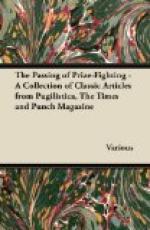The speech of Sir ROBERT PEEL was a pithy illustration of the good old Tory creed. He opens his oration with a benevolent and patriotic yearning for the comforts of Parliamentary warmth and ventilation. He moves for papers connected with “the building of the two houses of Parliament, and with the adoption of measures for warming and ventilating those houses!” The whole policy of the Tories has ever exemplified their love of nice warm places; though, certainly, they have not been very great sticklers for atmospheric purity. Indeed, like certain other labourers, who work by night, they have toiled in the foulest air,—have profited by the most noisome labour. When Lord JOHN RUSSELL introduced that imperfect mode of ventilation, the Reform Bill, into the house, had he provided for a full and pure supply of public opinion,—had he ventilated the Commons by a more extended franchise,—Sir ROBERT PEEL would not, as minister, have shown such magnanimous concern for the creature comforts of Members of Parliament—he might, indeed, have still displayed his undying love of a warm place; but he would not have enjoyed it on the bench of the Treasury. As for ventilation, why, the creature Toryism, like a frog, could live in the heart of a tree;—it being always provided that the tree should bear golden pippins.
We can, however, imagine that this solicitude of Sir ROBERT for the ease and comfort of the legislative Magi may operate to his advantage in the minds of certain honest folk, touched by the humanity which sheds so sweet a light upon the opening oration of the new minister. “If”—they will doubtless think—“the humane Baronet feels so acutely for the Lords Spiritual and Temporal,—if he has this regard for the convenience of only 658 knights and burgesses,—if, in his enlarged humanity, he can feel for so helpless a creature as the Earl of COVENTRY, so mild, so unassuming a prelate as the Bishop of EXETER—if he can sympathise with the wants of even a D’ISRAELI, and tax his mighty intellect to make even SIBTHORP comfortable,—surely the same minister will have, aye, a morbid sense of the wants, the daily wretchedness of hundreds of thousands, who, with the fiend Corn Law grinning at their fireless hearths—pine and perish in weavers’ hovels, for the which there has as yet been no ’adoption of measures for the warming and ventilating.’” “Surely”—they will think—“the man whose sympathy is active for a few of the ‘meanest things that live’ will gush with sensibility towards a countless multitude, fluttering into rags and gaunt with famine. He will go back to first principles; he will, with a giant’s arm, knock down all the conventionalities built by the selfishness of man—(and what a labourer is selfishness! there was no such hard worker at the Pyramids or the wall of China)—between him and his fellow! Hunger will be fed—nakedness will be clothed—and God’s image, though stricken with age, and broken with disease, be acknowledged; not in the cut-and-dried Pharisaical phrase of trading Church-goers, as a thing vested with immortality—as a creature fashioned for everlasting solemnities—but practically treated as of the great family of man—a brother, invited with the noblest of the Caesars, to an immortal banquet!”




